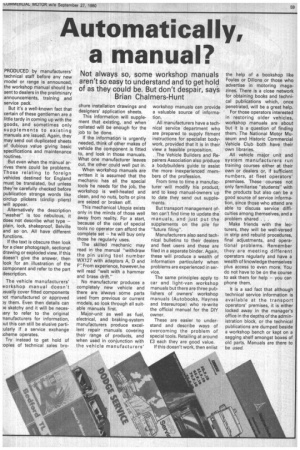• Automatically, a manual?
Page 61

If you've noticed an error in this article please click here to report it so we can fix it.
Not always so, some workshop manuals aren't so easy to understand and to get hold of as they could be. But don't despair, says Brian Chalmers-Hunt
PRODUCED by manufacturers' technical staff before any new model or range is announced, the workshop manual should be sent to dealers in the preliminary announcements, training and service pack.
But it's a well-known fact that certain of these gentlemen are a little tardy in coming up with the goods, and sometimes only supplements to existing manuals are issued. Again, they may send out duplicated sheets of dubious value giving basic specifications and maintenance routines.
But even when the manual arrives there could be problems. Those relating to foreign vehicles destined for England must be translated, but unless they're carefully checked before publication strange words like circlup plickers (circlip pliers) will appear.
Alternatively the description "washer" is too nebulous, it does not describe what type — plain, lock, shakeproof, Belville and so on. All have different functions.
If the text is obscure then look for a clear photograph, sectional drawing or exploded view. If this doesn't give the answer, then look for an illustration of the component and refer to the part description.
The vehicle manufacturers' workshop manual doesn't Jsually cover fitted components lot manufactured or approved )y them. Even then details can )e sketchy and it will be necesiary to refer to the original nanufacturers for information, )ut this can still be elusive parti:ularly if a service exchange cheme operates.
Try instead to get hold of :opies of technical sales bra
chure installation drawings and designers' application sheets.
This information will supplement that existing, and when collated will be enough for the job to be done.
If the information is urgently needed, think of other makes of vehicle the component is fitted to, and look in those manuals. What one manufacturer leaves out, the other could well put in.
When workshop manuals are written it is assumed that the mechanic has all the special tools he needs for the job, the workshop is well-heated and clean, and no nuts, bolts or pins are seized or broken off.
This mechanical Utopia exists only in the minds of those well away from reality. For a start, because of the cost of special tools no operator can afford the complete set — he will buy only those he regularly uses.
The skilled mechanic may read in the manual "withdraw the pin using tool number WX127 with adaptors A, D and From experience, however,he will read "welt with a hammer and brass drift."
No manufacturer produces a completely new vehicle and there are always some parts used from previous or current models, so look through all suitable manuals first.
Major-unit as well as fuel, electrical, and braking-system manufacturers produce excellent repair manuals covering their range of products, and when used in conjunction with the vehicle manufacturers' workshop manuals can provide a valuable source of information.
All manufacturers have a technical service department who are prepared to supply fitment instructions for specialist bodywork, provided that it is in their view a feasible proposition.
The Vehicle Builders and Repairers Association also produce a bodybuilders guide to assist the more inexperienced members of the profession.
From time to time a manufacturer will modify his product, and to keep manual-owners up to date they send out supplements.
But transport management often can't find time to update the manuals, and just put the supplements on the pile for "future filing".
Manufacturers also send technical bulletins to their dealers and fleet users and these are filed in a separate binder. Again, these will produce a wealth of information particularly when problems are experienced in service.
The same principles apply to car and light-van workshop manuals but there are three publishers of owners' workshop manuals (Autobooks, Haynes and Intereurope) who re-write the official manual for the DIY owner.
These are easier to understand and describe ways of overcoming the problem of special tools. Retailing at around £3 each they are good value.
If this doesn't work, then enlist the help of a bookshop like Foyles or Dilions or those who advertise in motoring magazines. There is a close network for obtaining books and technical publications which, once penetrated, will be a great help.
For those operators interested in restoring older vehicles, workshop manuals are about but it is a question of finding them. The National Motor Museum and Historic Commercial Vehicle Club both have their own libraries.
All vehicle major unit and system manufacturers run training courses either at their own or dealers or, if sufficient numbers, at fleet operators' premises. These courses not only familiarise "students" with the products but also can be a good source of service information, since those who attend are able to discuss service difficulties among themselves, and a problem shared . . .
Make friends with the lecturers, they will be well-Versed in strip and rebuild procedures, final adjustments, and operational problems. Remember they are meeting different operators regularly and have a wealth of knowledge themselves plus access to even more. You do not have to be on the course to ask them for help — you can phone them.
It is a sad fact that although technical service information is available at the transport operators' premises, it is either locked away in the manager's office in the depths of the admin istration block, or the technical publications are dumped beside a workshop bench or kept on a sagging shelf amongst boxes of old parts. Manuals are there to be used.




























































































































